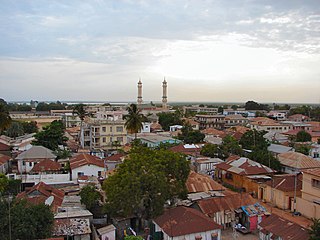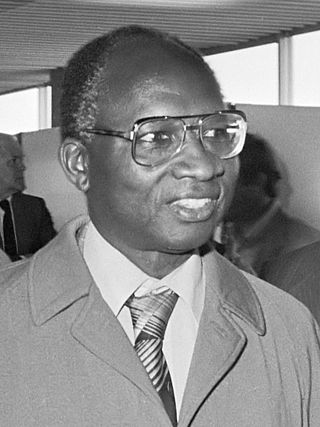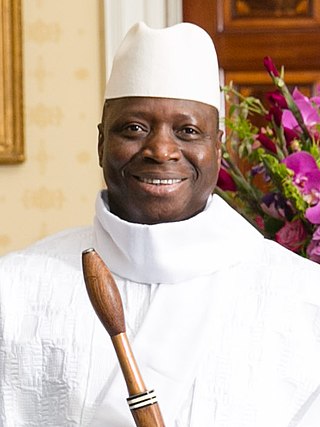Related Research Articles

The Gambia, officially the Republic of The Gambia, is a country in West Africa. It is the smallest country within mainland Africa and is surrounded by Senegal, except for its western coast on the Atlantic Ocean. The Gambia is situated on both sides of the lower reaches of the Gambia River, the nation's namesake, which flows through the centre of the Gambia and empties into the Atlantic Ocean, and elucidates the long shape of the country. It has an area of 11,300 square kilometres (4,400 sq mi) with a population of 1,857,181 as of the April 2013 census. Banjul is the Gambian capital and the country's largest metropolitan area, while the largest cities are Serekunda and Brikama.

Banjul, officially the City of Banjul, is the capital and fourth largest city of The Gambia. It is the centre of the eponymous administrative division which is home to an estimated 400,000 residents, making it The Gambia's largest and most densely populated metropolitan area. Banjul is on St Mary's Island, where the Gambia River enters the Atlantic Ocean. The population of the city proper is 31,301, with the Greater Banjul Area, which includes the City of Banjul and the Kanifing Municipal Council, at a population of 413,397. The island is connected to the mainland to the west and the rest of Greater Banjul Area via bridges. There are also ferries linking Banjul to the mainland at the other side of the river.
The first written records of the region come from French traders (barbers) in the 9th and 10th centuries. In medieval times, the region was dominated by the Trans-Saharan trade and was ruled by the Mali Empire. In the 16th century, the region came to be ruled by the Songhai Empire. The first Europeans to visit the Gambia River were the Portuguese in the 15th century, in 1447, who attempted to settle on the river banks, but no settlement of significant size was established. Descendants of the Portuguese settlers remained until the 18th century. In the late 16th century, English merchants attempted to begin a trade with the Gambia, reporting that it was "a river of secret trade and riches concealed by the Portuguese."

Sir Dawda Kairaba Jawara was a Gambian politician who served as Prime Minister from 1962-70, and then as the first President of the Gambia from 1970-94.

The People's Progressive Party is a political party in the Gambia. It was the dominant ruling party of the House of Representatives and the presidency from 1962 to 1994. The president throughout this time period was Dawda Jawara. The People's Progressive Party lost power after the 1994 Gambian coup d'état, a military coup led by young, junior military officers. The Alliance for Patriotic Reorientation and Construction (APRC) then became the dominant party of the Gambia. The People's Progressive Party remains active, but lacking the same level of support it garnered in the 20th century.
Sheriff Mustapha Dibba was a veteran Gambian politician who was the 1st Vice-President of the Gambia (1970–1972) and also served as the country's National Assembly speaker from 2002 to 2006. He was also leader of the National Convention Party (NCP).

Pierre Sarr N'Jie was a Gambian lawyer and politician who served as the Chief Minister of the Gambia from 1961 to 1962. He was the country's first head of government following the declaration of self-rule in 1961. From 1952 until 1977, he was leader of the United Party. He was also a member of the House of Representatives from 1960 to 1972, and de facto Leader of the Opposition for a period, opposite Dawda Jawara.
The Democratic Party was a political party in the Gambia. The party was founded during the pre-independence period in the colony of Bathurst. Ahead of the 1962 general elections, the DP merged with the Muslim Congress Party to form the Democratic Congress Alliance. In 1960, Alieu Ebrima Cham Joof who has been one of the original members was elected at its Social Secretary.

An election for the one elected seat on the Legislative Council was held in the Gambia in 1947. It was the first time that the Council had had a directly elected representative.

The Democratic Congress Alliance (DCA) was a political alliance in the Gambia. It was formed in the run-up to the 1960 general elections by the Democratic Party and the Muslim Congress Party.

General elections were held in the Gambia on 26 May 1966. They result was a victory for the ruling People's Progressive Party, which won 24 of the 32 elected seats. Voter turnout was 71.1%.
Edward Francis Small was a Gambian statesman who has been described as the "trailblazer of Gambian political consciousness." One of the few educated Africans in the Gambia Colony and Protectorate during the early 20th century, Small founded the country's first trade union, the country's first political party, and was the first citizen elected to its legislature. He was also a delegate to and leader of the National Congress of British West Africa (NCBWA).

Parliamentary elections were held in the Gambia on 29 March 2012. The ruling Alliance for Patriotic Reorientation and Construction (APRC) won 43 of the 48 elected seats.

Alieu Ebrima Cham Joof commonly known as Cham Joof or Alhaji Cham Joof, was a Gambian historian, politician, author, trade unionist, broadcaster, radio programme director, scout master, Pan-Africanist, lecturer, columnist, activist and an African nationalist who advocated for the Gambia's independence during the colonial era.
Alieu Badara Njie was a Gambian statesman who served as the 3rd Vice-President of the Gambia from 1977 to 1981. He served as the first Gambian Ambassador to Senegal and in Dawda Jawara's first cabinet. He held several ministerial roles under Jawara and played a key role in securing Gambian independence. He was Minister of Foreign Affairs from 1965–1967 and 1974–77, Minister of Communications from 1960–1961 and 1963–1965, Minister of Works from 1962–1965, Minister of Information from 1970–1971, and Minister of Agriculture from 1972–1974.
The Legislative Council of the Gambia was the legislature of the Gambia Colony and Protectorate from 1843 to 1866, and from 1888 to 1960.
Trade unions in The Gambia are regulated under the Labour Act 2007. The first trade union was the Bathurst Trade Union (BTU), founded in 1929, which led a general strike that year. General strikes were also led by the Gambia Workers' Union (GWU) in 1960, 1961, 1967, and 1970, although not all were successful. There are three trade union centres in The Gambia: the Gambia Trade Union Bureau (GamTUB), the Gambian Workers' Confederation (GWC), and the Gambia National Trade Union Congress (GNTUC). The country joined the International Labour Organization (ILO) in 1995.

Half Die is an area within Banjul, the capital of The Gambia. It was also known as Mocam Town, Moka Town, or Wildman Town. During the colonial period the area was noted for being flooded repeatedly, and was the home to the poorer sections of the city.
Ibrahima Muhammadu/Momodou Garba-Jahumpa (1912–1994), was a Gambian trade union leader and politician who served as the Minister for Agriculture, Minister for Health and Minister for Finance.
References
- 1 2 Democracy in The Gambia by Carlene J Edie Archived 2006-09-27 at the Wayback Machine
- 1 2 Hughes, Arnold. From Green Uprising to National Reconciliation: The People's Progressive Party in the Gambia 1959-1973 , in Canadian Journal of African Studies, Vol. 9, No. 1. (1975), pp. 61-74.
- ↑ Hughes, Arnold ; Perfect, Davi. Trade Unionism in the Gambia , in African Affairs, Vol. 88, No. 353. (Oct., 1989), pp. 549-572.